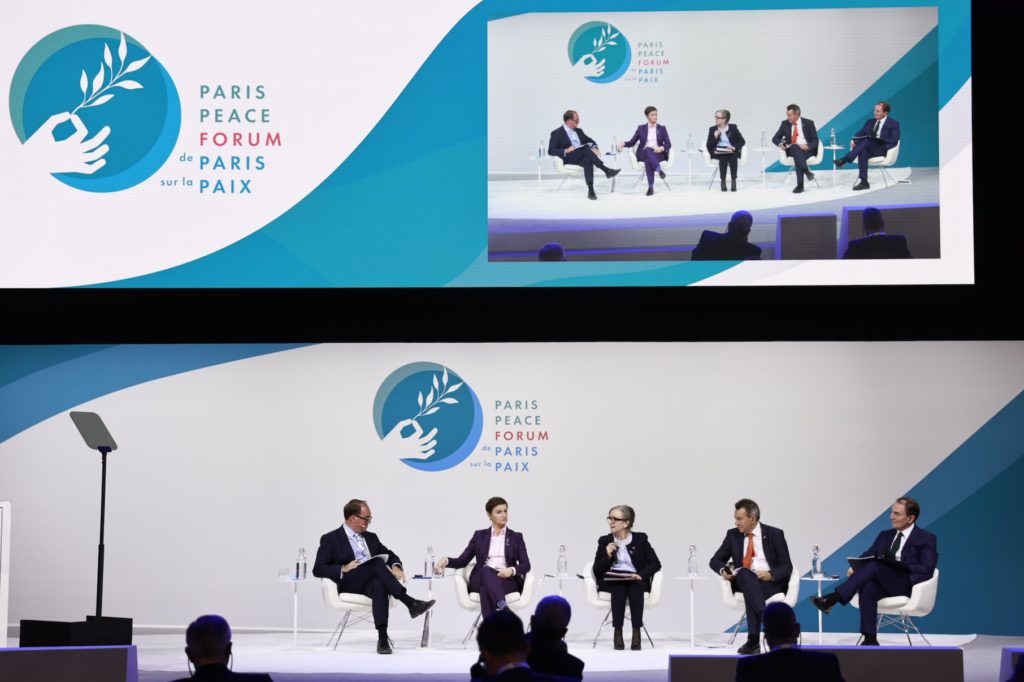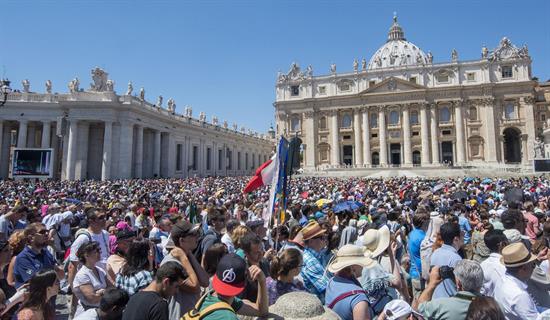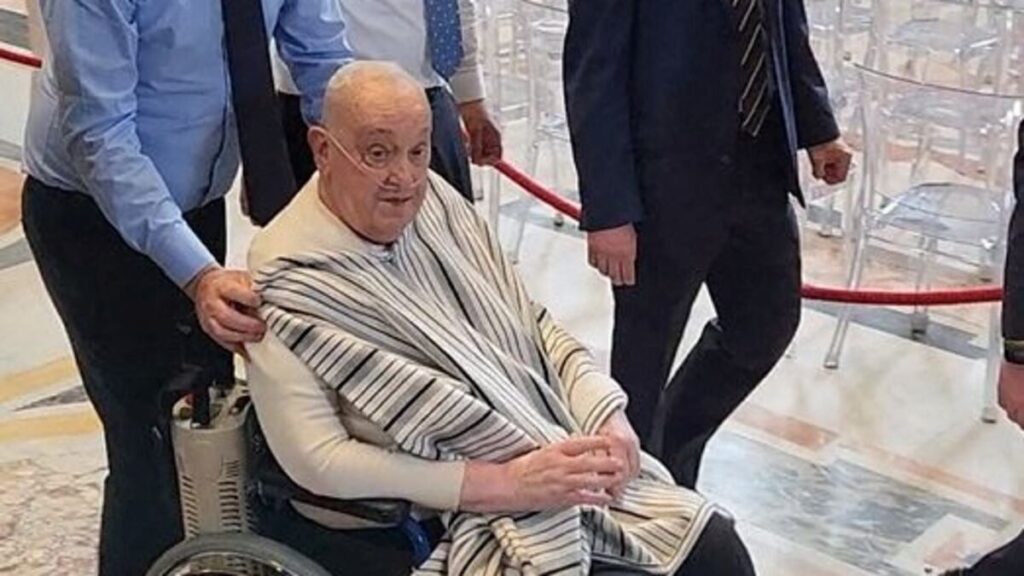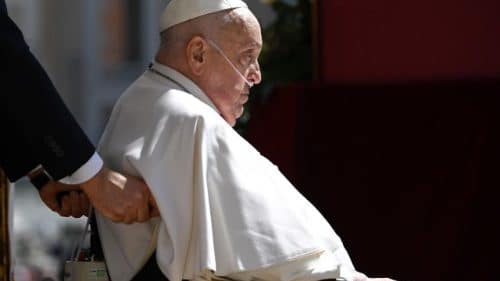Pope: Peace, Good Governance, Better Future
To Come Out Better from the COVID-19 Pandemic

“I hope it will be successful and help to promote peace, good governance, and a better future for all. That it may help us to come out better from the COVID-19 pandemic,” said Pope Francis to the participants in Paris’ Fourth Forum on Peace, gathered from November 11-13, 2021.
In his allocution, the Holy Father pointed out that in the present historical moment, “the human family is facing a choice. The first possibility is the so-called ‘return to normality.’” However, he said, that “the reality we knew before the pandemic was one in which wealth and economic growth were reserved for a minority when millions of people were unable to satisfy their most basic needs and lead a dignified life; a world in which our Earth was plundered by the myopic exploitation of resources, by contamination, by “throwaway” consumerism (cf. Encyclical Laudato Si’, No. 22).”
Work Together to Come Out Better
In this “globalized” but “torn” world, “the decisions we take today to come out of the crisis determine the ‘trajectory’ of the future generations” and “we often lose sight of the fact that we are a global community and that ‘nobody can save himself, that it’ only possible to save ourselves together.” Hence our need for “a new way out; we must work together to come out better than before.”
The Pope also considers that the most urgent question that needs attention is “that there cannot be peaceful cooperation without a concrete, collective commitment to complete disarmament. In this connection, “global military expenditure is now higher than that registered at the end of the ‘Cold War’ and it increases constantly every year. In fact, explained the Pontiff, “the dominant classes and governments justify this rearmament evoking the abusive idea of dissuasion based on the balance of armaments.”
Responsible Hope
According to Pope Francis, “the pandemic has been a revelation for all of us about the limitations and deficiencies of our societies and our ways of life. However, in the midst of this dark reality, we must have hope, because hope is ‘a generator of energy, which stimulates the intelligence and gives the will all its dynamism’ (. . . ). “My hope is that the Christian Tradition, in particular, the Social Doctrine of the Church, as well as other religious traditions, will be able to help to assure them the firm hope that injustice and violence are not inevitable, that they are not our destiny,” he continued
“Therefore, in face of the consequences of the great storm that disturbed the world, our conscience calls us to a responsible hope, namely <and> concretely, not to follow the easy path to return to a ‘normality’ marked by injustice, but to accept the challenge to assume the crisis as ‘a real opportunity of conversion and change to rethink our way of life and our economic and social systems,” he said.
Finally, the Successor of Peter called not to lose “this opportunity to improve our world; adopt means that are decidedly more just, to advance and build peace, driven by this conviction, it’s possible to generate economic models that attend to the needs of all, preserving the gifts of nature, as well as policies with a vision of the future, which promote the integral development of the human family.”
Here is the full text of the Pope’s message.
* * *
Distinguished Authorities, Ladies and Gentlemen!
I express a cordial greeting to each one of you, gathered for Paris’ Fourth Forum on Peace. I am grateful for this opportunity to meet with you and to reflect. I hope the Forum will be successful and help to promote peace, good governance and a better future for all. May it help us to come out better of the COVID-19 pandemic.
In this historical moment, the human family is faced with a choice. The first possibility is the so-called “return to normality.” However, the reality we knew before the pandemic was one in which wealth and economic growth were reserved for a minority when millions of people could not satisfy their most basic needs and lead a dignified life; a world in which our Earth was plundered by the myopic exploitation of resources, by contamination, by “throwaway” consumerism (cf. Encyclical Laudato Si’, No. 22) and wounded by wars and experiments with arms of mass destruction. Return to normality would also mean a return to old social structures inspired in “self-sufficiency, nationalism, protectionism, individualism and “isolation” by excluding our poorest brothers and sisters.[1] Is this a future we can choose?
In this globalized but torn world, the decisions we take today to come out of the crisis determine the “trajectory” of future generations. We often lose sight of the fact that we are a global community and that “no one can save himself, that it’s only possible to save ourselves together” (Encyclical Fratelli Tutti, no. 32). Therefore, we need a new way out; we must work together to come out better than before.[2]
The first and most urgent question to which we must pay attention is that there cannot be peaceful cooperation without a concrete, collective commitment to complete disarmament. The global military expenditure is now above the level registered at the end of the “Cold War” and increases constantly every year. In fact, the dominant classes and governments justify this rearmament, evoking the abusive idea of dissuasion based on the balance of armaments. In this perspective, States tend to pursue their interests primarily on the basis of the use or threat of force. However, this system does not guarantee the building or maintenance of peace. In fact, the idea of dissuasion has been deceitful in many cases, giving way to humanitarian tragedies on a large scale. Pope John XXIII already said in his Encyclical Pacem in Terris: “for the axiom that peace results from the balance of armaments, we substitute the principle that true peace can only be built on mutual trust” (no. 113).
It must also be pointed out that the logic of dissuasion has been associated with the logic of the free market, according to which armament can be considered on the same footing as all other manufactured products and, therefore, be freely commercialized in the whole world. Hence it’s no accident that for years we were witnesses without reservations of the expansion of the arms market at the global level.
The pandemic has been a revelation for all of us of the limitations and deficiencies of our societies and our ways of life. However, in the midst of this dark reality, we must have hope, because hope is “a generator of energy, which stimulates the intelligence and give the will all its dynamism.”[3] Hope invites us to dream big and to give room to the imagination of new possibilities. Hope is daring and fosters action based on the awareness that reality can be changed.[4] My hope is that the Christian Tradition, in particular, the Social Doctrine of the Church, as well as other religious traditions, can help to assure them the firm hope that injustice and violence are not inevitable, that they are not our destiny.
Therefore, in face of the consequences of the great storm that disturbed the world, our conscience calls us to a responsible hope, that is, concretely, not to follow the easy path to return to a “normality” marked by injustice, but to accept the challenge to assume the crisis as “a real opportunity of conversion and change to rethink our way of life and our economic and social systems.”[5] Responsible hope enables us to reject the temptation to easy solutions and gives us the courage to advance on the path of the common good, to the care of the poor and of our common home.
Let us not waste this opportunity to improve our world; adopt means that are decidedly more just to advance and build peace. Driven by this conviction, it is possible to generate economic models that attend to the needs of all, preserving the gifts of nature, as well as policies with a vision of the future that promotes the integral development of the human family.[6]
Ladies and gentlemen, let us face this crisis together, trying to heal in-depth the wounds of the human family. May this word of the prophet Jeremiah inspire us, which he addressed to the people at a time of grave crisis: “Stand by the roads, and look, and ask for the ancient paths, where the good way is; and walk in it, and find rest for your souls” (Jeremiah 6:16).
I wish you good work and invoke heavenly blessings upon you.
Vatican, October 30, 2021
[1] Cf. Video-Message on the Occasion of the 75th Period of Sessions of the United Nations General Assembly, September 25, 2020.
[2] Cf. Catechesis – “Healing the World:: 5. Solidarity and Virtue of Faith, September 2, 2020.
[3] Benedict XVI, Address to the Authorities, Cotonou-Benin, November 19, 2011.
[4] Cf. Catechesis “Healing the World”: 9. Preparing the Future with Jesus Who Saves and Heals, September 30, 2020.
[5] Cf. Video-Message on the Occasion of the 75th Period of Sessions of the United Nations General Assembly, September 25, 2020.
[6] See Ibid.
© Libreria Editrice Vatican
Translation by Virginia M. Forrester
Related

Pope Francis Sends a Message of Hope to the Young People of the UNIV 2025 International Congress
Exaudi Staff
11 April, 2025
5 min

Pope Francis continues his recovery at Santa Marta with signs of improvement
Exaudi Staff
11 April, 2025
1 min

Pope Francis silently prays before St. Pius X in the heart of the Vatican
Exaudi Staff
10 April, 2025
1 min

Pope Francis’ Catechesis: The Rich Man. Jesus “Looked at Him with Love”
Exaudi Staff
09 April, 2025
4 min
 (EN)
(EN)
 (ES)
(ES)
 (IT)
(IT)

